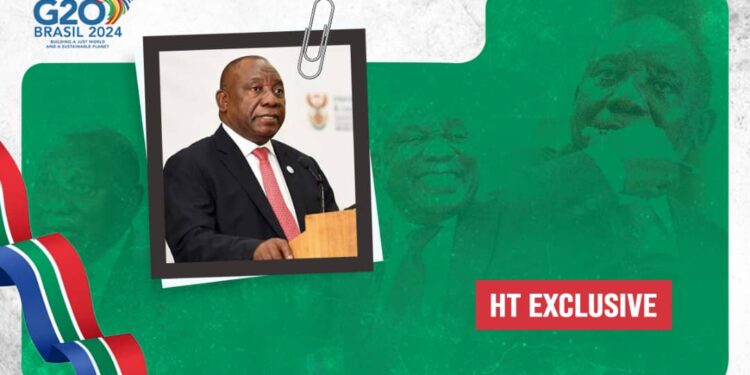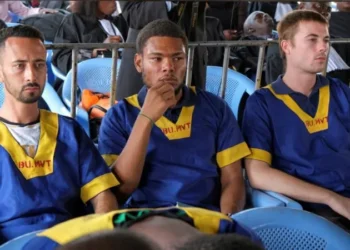By Enyichukwu Enemanna
The just concluded G-20 Summit in Rio de Janeiro, Brazil may have come with a basketful of takeaways for Africa, especially at a time when the continent looks up to developed countries for partnership to address its nagging challenges, key among which are climate change, food and human insecurity, terrorism, energy transition and inclusive growth.
With the theme, “Building a Just World and a Sustainable Planet”, the Summit highlighted the commitment of G-20 to fair agreements that promote global economic and social development and the reduction of inequality worldwide.
It was the first of such gatherings since the AU was admitted last year into the bloc as a permanent member. Its member countries include, Argentina, Australia, Canada, China, France, Germany, India, Indonesia, Italy, Japan, Mexico, the Republic of Korea, Russia, Saudi Arabia, South Africa, Türkiye, the UK, the US, as well as the European Union.
High-powered consultations and pre-summit meetings had taken place where the AU Commissioner for Economic Development, Tourism, Trade, Industry and Minerals and the AU Sherpa for the G-20 Albert Muchanga met with South Africa, the only member nation from Africa, and outlined AU’s six key priority areas, which include inclusive growth, reforming the global financial architecture, ensuring food security and agriculture adaptation to climate change, facilitating a just (energy) transition, promoting trade and investment, and enhancing health.
Incidentally, these priority areas align with the United Nations (UN) Sustainable Development Goals (SDGs) and AU Agenda 2063. This will be discussed elaborately as this piece progresses.
What’s for Africa?
Perhaps, the icing on the cake at the end of the Nov 18-19 Summit which also had in attendance the Nigerian President, Bola Tinubu who came on the invitation of the President of the host country, Lula da Silva, was the emergence of an African leader, for the first time in history as the President of the bloc.
South Africa succeeded Brazil as the leader of the highly influential bloc, which represents the world’s largest economies. This rare privilege brings Africa closer to an opportunity to amplify the major concerns bedeviling the continent.
The G-20 rotational presidency is not just a mere symbolic position to allow member nations have a turn, it gives the presiding country the opportunity to set the agenda, champion discussions and push forward reforms that reflect global priorities.
With its one-year tenure limit, an opportunity that does not come often, South Africa can leave an enduring legacy by positioning itself as mouthpiece to champion advocacy for more African representation in global decision-making bodies, such as the International Monetary Fund (IMF) and the World Bank.
Also, maximizing the opportunity of sitting at the decision-making table of this bloc, South Africa can activate a machinery that will drive an increased infrastructural development, trade and investment that can have a widespread impact across the continent and not just a self-centred agenda that negates the Ubuntu philosophy which even Desmond Tutu and Nelson Mandela (both from South Africa) fought hard to propagate.
It is heartwarming that President Cyril Ramaphosa has pledged to prioritise Africa’s development and the Global South’s interests during his tenure which commences Dec. 1. “We will use this moment to bring the development priorities of the African continent and the Global South more firmly onto the agenda of the G20,” Ramaphosa said shortly after the presidency of G-20 fell on his shoulder.
The South African leader highlighted three key areas of focus which will form the cardinal objective of his presidency. They include, promoting inclusive economic growth, addressing food security, and leveraging artificial intelligence and innovation for sustainable development.
Johannesburg has demonstrated an assuring body language which gives the people hope that under its presidency of G-20, the bloc will map out far-reaching solutions that will pay attention to crucial areas of the economy, such as indindustrialization, employment, and reducing inequality, along with driving discussions on critical global issues.
“As South Africa, we undertake to advance the work of the G-20 towards achieving greater global economic growth and sustainable development. We will work to ensure that no one is left behind,” Ramaphosa stated.
Debt Relief
Africa is facing a debt crisis that threatens economic stability, growth and development. In 2023, more than half of low-income African countries were either in debt distress or at high risk of it, underscoring the urgent need for comprehensive solutions. Through mechanisms such as the Debt Service Suspension Initiative (DSSI) and the Common Framework for Debt Treatments, the G-20 has played a constructive role in tackling these mounting issues. However, there remains a need for innovative and inclusive approaches to debt restructuring and relief. This emphasises the importance of including African nations in discussions and decision-making processes to develop comprehensive solutions to debt crises
According to the United Nations Conference on Trade and Development (UNCTAD), Africa’s debt has surged by 183% since 2010, a rate nearly four times faster than the continent’s GDP growth in dollar terms. With debt levels soaring across the continent, many African nations are struggling to manage debt repayments while also addressing pressing social and economic needs. While interest payments in developing countries have risen by around 64% over the past decade, Africa has experienced a staggering 132% increase, significantly limiting investment in essential public services.
South Africa’s G-20 presidency offers the chance to address Africa’s sovereign debt crisis in a way that promotes long-term economic stability and equity, while pushing for innovative financing solutions to meet development needs.
Inclusive growth
It is interesting that the new leadership of G-20 has assured that it will leave no one behind, which highlights the transformative promise of the 2030 Agenda for Sustainable Development and its Sustainable Development Goals (SDGs), representing the unequivocal commitment of all UN Member States to eradicate poverty, end discrimination and exclusion.
The 2013 Africa’s 50-year development plan known as AU Agenda 2063 which anchors on self-determination, freedom, progress and collective prosperity could receive a new boost with Africa at the helm of affairs in G-20. Critical infrastructure is a key ingredient in driving a robust development. Attracting investment that will upscale connectivity and large-scale infrastructure projects in the areas of transport, energy, and digital technology will be a masterstroke that will integrate African economies and boost regional trade.
Encouraging collaboration between governments and private sectors to finance and execute sustainable infrastructure initiatives, expansion of access to concessional loans and grants through institutions like the African Development Bank and the G-20’s Compact with Africa will be a giant move that can broaden the ecosystem for inclusion in economic growth.
Africa as an import-dependent continent can utilize the opportunity at its disposal to bridge the gap through the promotion of industrialization that can help the continent move up the value chain. This can be achieved through massive investment in manufacturing and agro-processing sectors.
Additionally, Africa still houses a large gap in technology. Some sort of transfer of technology and knowledge to enhance local capacity and competitiveness is the way to strengthen inclusive growth. The continent can also take advantage of this privileged position to seek green investments and climate financing, which will ensure that African nations have access to resources for adaptation and mitigation efforts.
Declaration of G-20 Leaders
The Summit in Brazil came to an end on a note that appears to give hope to Africa and the developing world entirely. The 85-point G-20 Rio de Janeiro Leaders’ Declaration touched deeply on key areas that are of concern to both the African Union and South Africa.
It highlighted the multiple economic challenges facing nations and expressed commitment to foster strong, sustainable, balanced and inclusive growth, address cost of living pressures, safeguard fiscal sustainability and mitigate negative spillovers. The G-20 leaders also drew attention to the fact that inequality within and among countries is the root of most global challenges and promised increased efforts and reaffirmed strong commitment to the Sustainable Development Goals. The bloc declared that the world requires not only urgent action, but also socially just, environmentally sustainable and economically sound measures, which necessitated the motto, “Building a just world and a sustainable planet”.
They also made a firm declaration on the need to tackle poverty and hunger through a political will that will create the conditions to expand access to food. This the bloc seeks to achieve through the Global Alliance against Hunger and Poverty which has developed an approach to mobilize finance and knowledge sharing to support the implementation of country-led, country-owned, large-scale and evidence-based programmes, aiming to reduce hunger and poverty worldwide.
As the continent mounts the saddle to lead the rest of the world, it is hoped that by this time next year when South Africa will hand over the mantle of leadership to another member of the G-20, the continent will have a giant record of milestones to count.




































